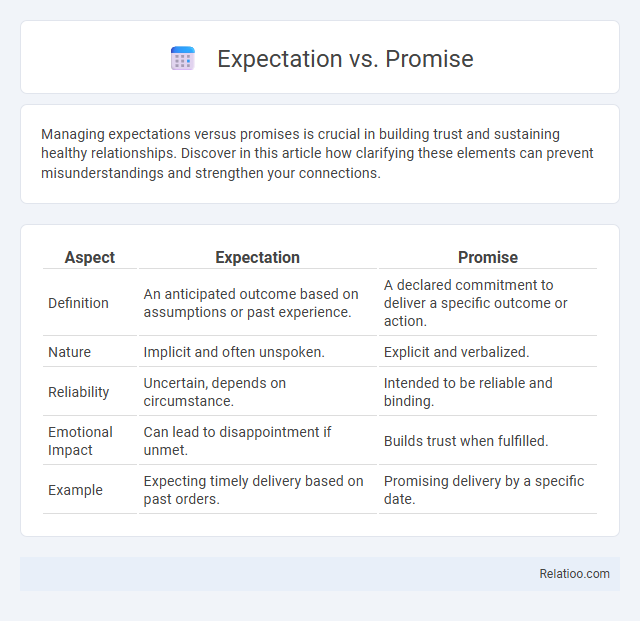Managing expectations versus promises is crucial in building trust and sustaining healthy relationships. Discover in this article how clarifying these elements can prevent misunderstandings and strengthen your connections.
Table of Comparison
| Aspect | Expectation | Promise |
|---|---|---|
| Definition | An anticipated outcome based on assumptions or past experience. | A declared commitment to deliver a specific outcome or action. |
| Nature | Implicit and often unspoken. | Explicit and verbalized. |
| Reliability | Uncertain, depends on circumstance. | Intended to be reliable and binding. |
| Emotional Impact | Can lead to disappointment if unmet. | Builds trust when fulfilled. |
| Example | Expecting timely delivery based on past orders. | Promising delivery by a specific date. |
Understanding Expectations and Promises
Understanding expectations and promises is crucial for clear communication and relationship management, as expectations are often unspoken beliefs about how others should behave, while promises are explicit commitments made by individuals. Misalignment between expectations and promises can lead to conflicts and misunderstandings, emphasizing the importance of clearly distinguishing what has been promised versus what is merely expected. Recognizing the potential for incompatibility when expectations exceed promises helps in managing trust and accountability effectively.
Key Differences Between Expectation and Promise
Expectation refers to a belief or assumption that a certain event or outcome will occur, often based on past experiences or societal norms, while a promise is a deliberate commitment made by a person or entity to perform or refrain from a specific action. The key difference lies in the binding nature; promises create obligations that can lead to accountability, whereas expectations are anticipations that may or may not be met without formal accountability. Incompatibility arises when an expectation contradicts a promise, leading to conflicts in fulfilling commitments or outcomes.
The Psychology Behind Expectation
Expectation shapes your perception and influences emotional responses by creating anticipatory beliefs about outcomes, often based on past experiences and social conditioning. When expectations are unmet, cognitive dissonance arises, triggering feelings of disappointment or frustration that affect mental well-being. Understanding the psychology behind expectation helps manage emotional resilience and align your mindset with realistic promises, reducing the impact of incompatibility in relationships or goals.
What Constitutes a Promise?
A promise constitutes a definitive commitment where one party explicitly agrees to perform or refrain from a specific action, creating a legally binding obligation. Unlike mere expectations, which are based on assumptions or desires without enforceable assurance, promises require clear intention and communication to establish trust and accountability. Recognizing incompatibility occurs when promises conflict with existing duties or prior agreements, potentially voiding or modifying the original commitment.
How Expectations Shape Relationships
Expectations influence relationships by setting perceived standards for behavior and outcomes, often guiding interactions and emotional responses between partners. When expectations align with promises made, trust and stability tend to strengthen, whereas unmet expectations create feelings of disappointment and conflict. Incompatibility arises when core expectations differ significantly, challenging the relationship's sustainability and requiring negotiation or adaptation to preserve connection.
The Impact of Broken Promises
Broken promises significantly erode trust and damage relationships by creating unmet expectations and highlighting incompatibility between parties. The disparity between what was expected and the commitment made often leads to conflict, resentment, and a loss of credibility. Understanding the impact of broken promises is essential for fostering reliable communication and maintaining long-term collaboration.
Managing Expectations for Better Outcomes
Managing expectations effectively involves clear communication of promises and acknowledgment of potential incompatibilities to avoid misunderstandings and conflicts. Setting realistic expectations aligned with deliverables and capabilities enhances trust and satisfaction among stakeholders. Identifying and addressing incompatibilities early helps in adjusting promises and expectations, leading to better outcomes and project success.
Strategies to Communicate Promises Effectively
Clear communication of promises requires setting realistic expectations while avoiding incompatibility between commitments and actual capabilities. You should use precise language and specify measurable outcomes to ensure mutual understanding and trust. Regularly reviewing progress and providing updates helps reinforce your reliability and address any potential misunderstandings promptly.
Expectation vs Promise in Professional Settings
In professional settings, expectations refer to beliefs about potential outcomes based on experience or assumptions, while promises are explicit commitments that create binding obligations. Misunderstanding the difference can lead to conflicts, as unmet expectations may not always constitute broken promises but can still impact team trust and morale. Your clarity in communicating promises versus managing expectations ensures stronger professional relationships and project success.
Finding Balance: Aligning Expectations with Promises
Aligning expectations with promises is crucial to maintaining trust and delivering consistent results. You must clearly communicate what can realistically be achieved to avoid incompatibility between what is expected and what is promised. Establishing transparent dialogue helps balance commitments and prevents misunderstandings that could damage relationships or project outcomes.

Infographic: Expectation vs Promise
 relatioo.com
relatioo.com